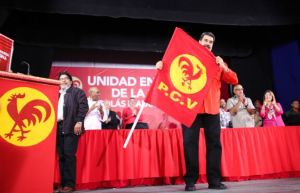nsnbc : Venezuela’s Communist Party (PCV) and the leftist Homeland for All Party (PPT) have confirmed that they will back United Socialist Party (PSUV) candidate and current incumbent President Nicolas Maduro in April’s upcoming presidential elections.
 The announcement is not surprising even though both the PCV and the PPT had previously indicated that they would not automatically back up behinf PSUV candidate Nicolas Maduro due to concerns over his handling of the country’s deep economic and political crisis. Both parties had also previously blamed Maduro for failure to adopt revolutionary measures wanting to go even farther than the de-facto constitutional coup d’ état Maduro and the PSUV were blamed for by the country’s opposition and international observers.
The announcement is not surprising even though both the PCV and the PPT had previously indicated that they would not automatically back up behinf PSUV candidate Nicolas Maduro due to concerns over his handling of the country’s deep economic and political crisis. Both parties had also previously blamed Maduro for failure to adopt revolutionary measures wanting to go even farther than the de-facto constitutional coup d’ état Maduro and the PSUV were blamed for by the country’s opposition and international observers.
However, on February 21, the PPT confirmed that it would support the PSUV candidate and that it would not “give up” on Maduro, while the communists revealed they would back the presidential incumbent Monday. The endorsements were the result of a series of assemblies among the parties’ membership bases over the last two weeks to decide whether to officially come out in support of Maduro, or to back another candidate.
The Communist Party (PCV) stated that the decision on the party’s endorsement of Maduro had been made during its fourteenth National Conference, while a political “programmatic” agreement had been reached between the two parties. “We have had the opportunity to work on a document in conjunction with the PCV, which brings together the agreements and proposals for the Revolution’s line in the coming years,” said Maduro.
Not surprisingly, the Communist party (PCV) would nearly exclude all reflection on failures of socialist (PSUV and allied) policies while putting the blame squarely on the usual scapegoats such as the USA and imperialism. In the seventeen-point agreement, the PCV noted that the part had recognized that the “growing immoral, illegal, and criminal interventionist aggression from US imperialism and its European allies in Europe against the Venezuelan Bolivarian process puts at risk the national liberation” project that had been set in motion with the election of Hugo Chavez Frias in 1998.
The party would also not draw attention to the fact that last year’s constitutional change that introduced direct party control over such things as parts of the prison system – prompting some to make comparison’s with the German SA’s “wild concentration camps”, and omit other details that led to the sharpest criticism about a fascist coup under left cover. Ironically, the PCV also omitted that Maduro’s and the PSUV changed the very constitution that was adopted under the presidency of the late Hugo Chavez.
However, the PCV and the PPT agreed to promote what they described as worker control and trade unionism, extend the rights of working people, strengthen revolutionary organisations, and to work toward an “exit from the current capitalist crisis which is not in favor of the bourgeoisie and transnational companies, but rather in the interests of the people”. They also concurred that this solution needed to be focused on the construction of a new “post-rentier productive model of sovereign development based on the protagonist participation of the workers, rural workers, and communards”. Critics would say all of the above translates into increased party control and less de facto sovereignty for workers who don’t agree with PSUV dictates. Also criticized is the collusion between trade unions and the ruling party.
The three-party agreement commits the PSUV to promote “collective and unified leadership” of the revolutionary process, which will include monthly bilateral meetings between top leaders of both parties. Speaking on the agreement Tuesday, Maduro said that he had received a lot of “criticism” from the PCV, but that he would work to “push forward a worker, anti-imperialist government”. “I have taken note of a lot of the things they proposed, there are some decisions in the area of labor in which some companies are not fulfilling the Constitution… I ask the minister [of Labour] to enforce labor stability and protection for the workers,” he said.
For its part, the PPT confirmed it had also reached a “co-responsibility agreement” for an “ethical, sovereign, secure and productive homeland” with the PSUV candidate. The nine page document, which the party shared on its Twitter page, whitewashed the PSUV’s track record while it used the usual scapegoats stating hat there are serious issues with “sectarianism, bureaucracy and corruption” at the heart of government which need rectification, but that it was necessary to defend Maduro against “imperialism”, and the forms of “unconventional warfare” that it said are being employed against the country.
The PSUV also recognized that the president had, “known how to courageously defend the sovereignty and peace of the Republic and has given continuity to the majority of the social programmes which benefit our people in spite of the fall of crude oil prices and the illegal and genocidal financial blockade.” Nonetheless, the party emphasized that the agreement was not a “blank cheque” for the national government or the PSUV, and was contingent upon the government opening up policy-making spaces to the PPT and other social movement leaders. For his part, Maduro welcomed the agreement, stating on Twitter that he would not let the party down. On Tuesday, Maduro formally registered his candidacy at the headquarters of the National Electoral Council in downtown Caracas, accompanied by supporters.
A/N – nsnbc 01.03.2018
Source Article from https://nsnbc.me/2018/03/01/87923/
Related posts:
Views: 0
 RSS Feed
RSS Feed

















 March 1st, 2018
March 1st, 2018  Awake Goy
Awake Goy 










 Posted in
Posted in  Tags:
Tags: 
















